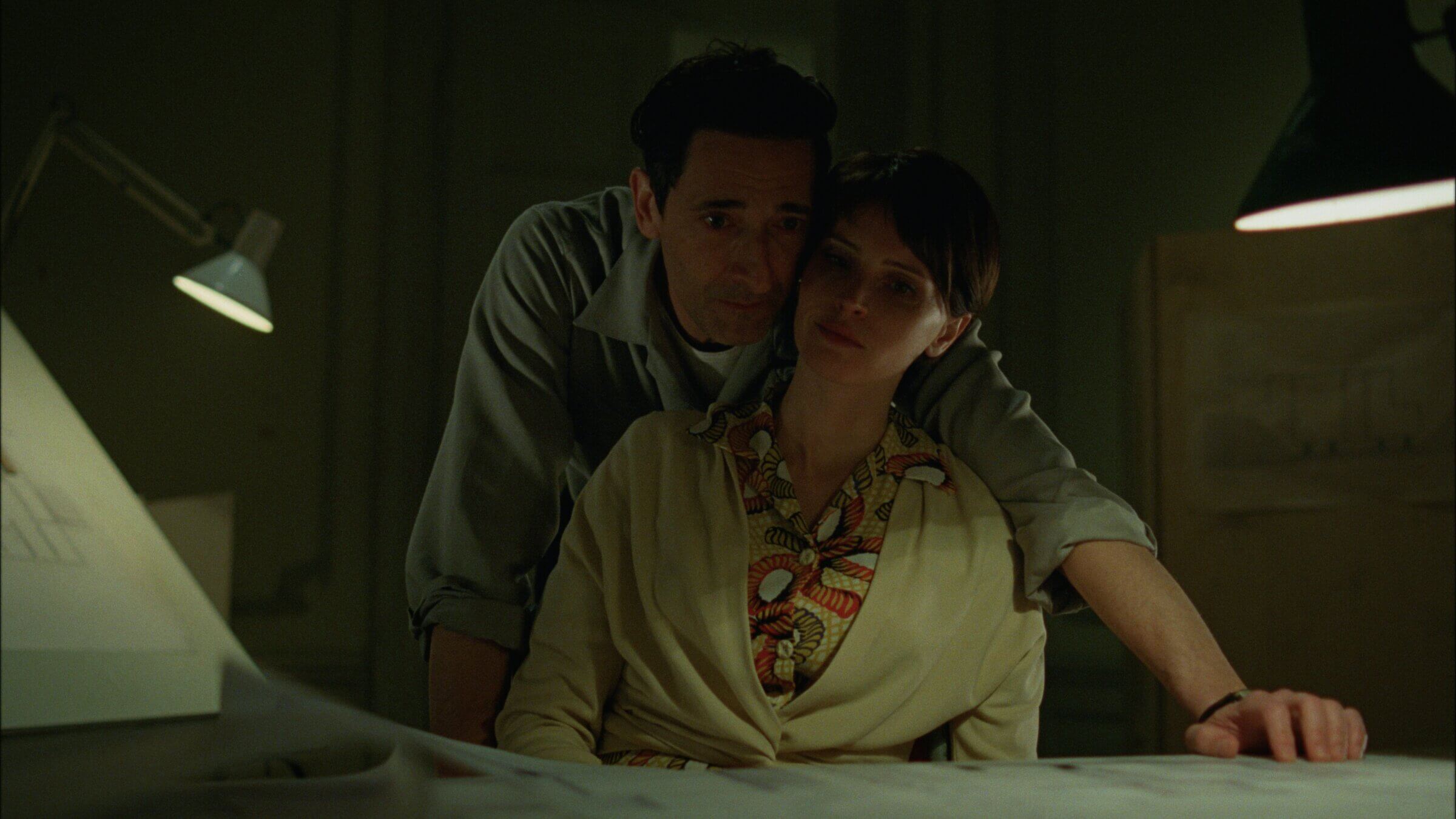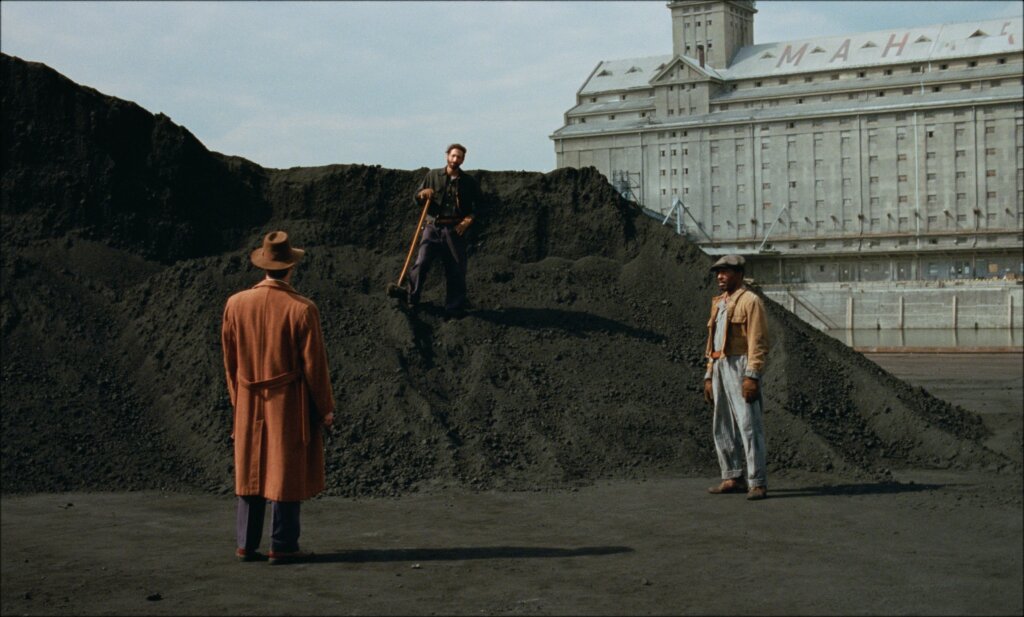In ‘The Brutalist,’ Adrien Brody wills an impossible dream
Brady Corbet’s epic follows a Holocaust survivor struggling to seize the American Dream

Adrien Brody and Felicity Jones in The Brutalist. Courtesy of Lol Crawley
Moshe Safdie’s design for Yad Vashem, the Holocaust museum in Jerusalem, is built around concepts of darkness and light.
The skylight casts down beams on a triangular tunnel, creating a prism in the smooth, gray trenches. Depending on the time of day, light seems to slash through the shadows of the darkest moments of history, until one emerges with a view of the Judaean hillside: the redemption of the Jewish people.
It’s architecture as parable — but it wasn’t built by a survivor.
Brady Corbet’s The Brutalist is about the construction of a work that, compared to Safdie’s brutalist masterpiece, seems almost laughably prosaic: a community center in Doylestown, Pennsylvania. But the man building it is no less meticulous.
The Bauhaus-trained architect László Tóth configures soaring monoliths of cement, connected via cavernous underground passages. Like Yad Vashem, Tóth’s work is built with light in mind: at dawn, noon and sunset, the sun filters in, forming a cross on the altar of the chapel.
Tóth — played by Adrien Brody, often speaking Hungarian — is a Holocaust survivor and an emigrant from Budapest. In Europe, he built libraries and synagogues. Arriving in Pennsylvania in the late 1940s, he shovels coal and works construction for a bowling alley.
His fortunes improve when a wealthy benefactor, Harrison Van Buren (Guy Pearce at his flintiest), learns about Tóth’s pedigree and asks him to build the center in honor of his mother. Tóth’s agony and ecstasy are, from almost the first moment, shaded by a cross. As Tóth builds, and works to get his wife and niece to America from the DP camps in Europe, the war is kept beneath the surface, even as its turmoil shapes the very foundations of his project.
What exactly Tóth suffered is mainly hinted at.
He numbs his pain with heroin. His cousin’s gentile wife tells him she can get his nose fixed (you’d be forgiven — and correct — in assuming it’s an antisemitic remark) and Tóth informs her he broke it jumping from a train car. When asked about the war by prying Christmas dinner guests at the Van Buren estate, he is evasive. When anyone suggests he take a job with a firm — not be his own boss — one suspects his reluctance is as much about pride as his fears of reentering into a kind of slavery.
As we’ll see, he’d rather let his work speak for him.
Corbet, who shot the almost-4-hour epic in VistaVision, a format beloved by midcentury auteurs, for a relative microbudget of under $10 million, is given to vertiginous camerawork and not shy about surrendering the lens to Tóth’s subjectivity. But he never dips into nightmares or visions of the camps.
What we have instead is a Yom Kippur service, where congregants beat their breasts in a rundown building, intercut with a train churning, delivering materials to the worksite of his Christian patron. Tóth attends Shacharit prayer at a storefront shul in Philadelphia and then waits in line at a church pantry — illuminated by a neon red cross — only to learn the kitchen has run out of Christian charity.
A crucifix is also visible in the home of his cousin Attila, played by Alessandro Nivola, who is now Catholic and using the surname “Miller.” Attila’s hospitality is similarly limited; he kicks Tóth out of his squalid spare room, suspecting him of putting the moves on his wife.
When Tóth’s wife, Erzsébet (Felicity Jones), reunites with him in the 1950s, together they face the reality of a country that accepts them only conditionally, as he is forced to work as a draftsman and she, Oxford-educated and an international politics correspondent before the war, as a lady’s columnist for a New York paper.
As Van Buren’s heir, Harry (Joe Alwyn, embodying failson), tells Tóth, expressing perhaps more than just his patrician family’s view, “We tolerate you.”
As in his previous films, Childhood of a Leader and Vox Lux, Corbet, who co-wrote the script with Mona Fastvold, is a deeply cynical storyteller. Here he is at his most expansive, with composer Daniel Blumberg’s robust fanfares and a David Leanian intermission. The grandiose presentation seems to bely the bleakness of the material’s outlook. But Corbet’s use of chipper archival ads, pitching Pennsylvania as an ideal place to live and work, underscore that what’s being sold is a fantasy of upward mobility out of our hero’s reach.
Fated to be an outsider, Tóth must not only argue for his vision, as he did when his style was deemed “un-Germanic,” but defend himself against a Christian community suspicious of his plans for a sacred space they’re forcing him to include. (Tóth’s life and work borrows elements from the architect Marcel Breuer, but he, rather oddly, shares a name with a geologist who vandalized the Pietà.)
An easy read of The Brutalist would have Tóth building a new life as his project grows. But Corbet is suggesting that the past will always have a death grip on the artist’s work, a message delivered most pointedly by an epilogue at the Architecture Biennale, themed “The Presence of the Past.”

When we see Tóth make his first piece in his new country (a desk set), it’s accompanied by leaping sparks and a radio broadcast of David Ben-Gurion reading the Israeli Declaration of Independence, proclaiming the right of the Jewish people to be “masters of their own fate.”
It’s the dream of Tóth in America, and the vision of Yad Vashem in Israel, where Tóth’s niece will make aliyah, telling him “our repatriation is our liberation.”
Tóth’s center, we learn in the final minutes, is a covert Holocaust monument built to very specific specs. He struggled to make it on his own terms, bedeviled by naysayers, an abusive patron and literal train wrecks.
As the light sifts through its cracks, forming the cross, we’re left to wonder if mastery of one’s fate was only meant for some, and if all the others must compromise.
The film The Brutalist is playing at the New York Film Festival Sept. 28, Oct. 11 and Oct. 12.

















